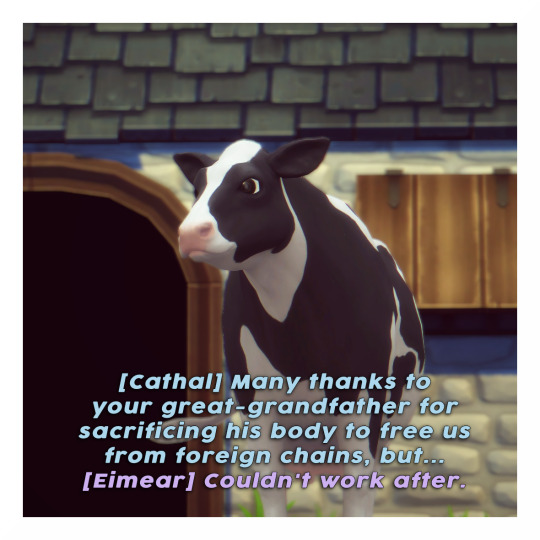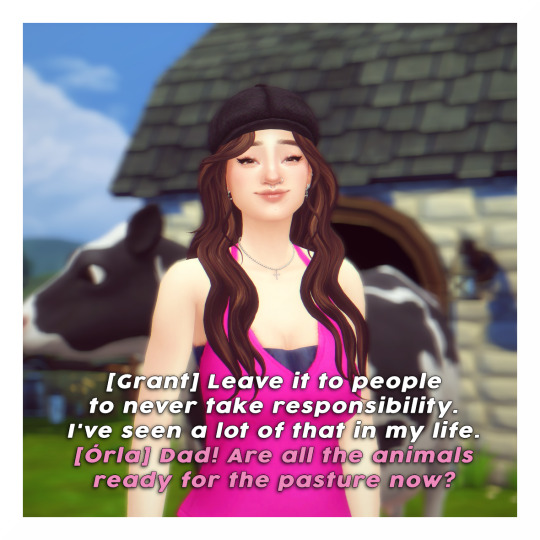#subsistence farmer
Text
i always find episodes like the ultimate enemy in shows intruiging because its like implied dan destroyed the entire world but like. thats a lot of people. and also places. is dan really going out to like, vanuatu and wreaking stuff. how is iceland going. how is madagascar affected by this. there are so many island nations. like im sure dan could pull off a collapse of most of the world trade network and governments by taking out key infrastructure but people are like cockroaches and this is dan we're talking about could he even point out Mauritius (island nation; population ~1.2 million) on a map
#we dont go over there thats where that crazy ghost blows everything up and a#we leave him alone he doesnt really mess with us#dan phantom#dark danny#danny phantom#selkie barks#many such shows have episodes like this#im convinced subsistence farmers are still going strong#one (1) guy and his henchman cannot singlehandedly end the world everywhere it is Too Big#i can see him taking over most of north america at best#maybe europe and asia and oceania are doing fine and are like#sorry for the rambling ive had A Day
24 notes
·
View notes
Text
I know they get a lot of grief both in-universe and out but replicators would be so goddamn convenient. No more coming home, crashing, then having to set up a full meal while checking to make sure you got all your micronutrients. You just program all that shit on your day off and come home to a full hot meal at any time.
You get all these characters whining about how “Awwwwwww but it’s not a REAL meal with REAL cooking and people taking REAL time to make these things” hon you want that you can take the time to MAKE IT YOURSELF while the rest of us enjoy meals on demand cause we actually know what it’s like to not have that option. Young people are so ungrateful these days.
#star trek#i see characters in star trek whining about replicators and i feel like a farmer seeing a kid talking about how great subsistence farming is#i'd like to see how enthusiastic you are when you have to actually do this as a part of life and not just a fun hobby#i'll be over here enjoying my twenty wildly different meals with tracked nutrients secretly embedded
398 notes
·
View notes
Text
bet back in the old days being a child of a monarch who is not the crown prince felt like barely missing the lottery ticket. i like power so id be super pissed if my dumbass sibling inherited the throne instead of me. i would probably kill or otherwise get rid of as many of my siblings as necessary for it to be me
#iso.txt#none of my ancestors were nobility of any kind though lmao#they were all peasants/subsistence farmers
3 notes
·
View notes
Text
some of us need to learn the difference between subsistence farming and for-profit farm management fr.
#no offense im just. noticing.#“farmer” is not a class#there are bourgeoisie farmers/farm managers#and proletariat farmers/workers#and people who farm for subsistence and sell the extra to feed their families#aka petit bourgeoisie farmers#politics#leftism#communism#pigeon.txt#opinion
27 notes
·
View notes
Text












next // previous
july 18, 2021
7:30 a.m.
cathal and eimear's house
#ts4#the sims 4#sims 4#sims 4 story#sims 4 storytelling#simblr#hlcn: everything the stars promised#heyyyyy remember that book grant was reading and the convo with his therapist about generational trauma and stuff??#yeah baby time to start exploring that topic#also it really is wild to think of how that generation lived#veryyyyy different#that was 100% how my grandparents lived#literally zero modern conveniences#i am sure there are some (even many) of that generation in any country who lived modernly but certainly not regular old subsistence farmers#holocene.docx#holocene.png#hlcn: grant#hlcn: cathal#hlcn: eimear#hlcn: orla
19 notes
·
View notes
Text
hehehe my cousin wants me to come with her to the you pick to pick peas this summer. 😁 i'm so excited.
#need to start warming up my hips and knees for a bunch of squatting and standing#maybe i should buy kneepads... wouldn't be the only time i'd use them but more like the final straw..#honest to god. i know it's back-breaking work and destroys your joints pretty quick like. but i love picking some produce.#i wanna say 'i was born to pick veggies!' or 'i could do it every day!' but these comments feel insensitive considering that#for me#it is a seasonal hobby that i get to participate in to supplement my already sufficient diet#i don't know for a fact that i would have a bad time as a subsistence farmer but. well. let's be real.#adam yaps
2 notes
·
View notes
Text
Even people talking about how much women really did historically work so often leave out:
1)Spinning and weaving. Spinning constantly, taking that damn spindle with you everywhere to keep spinning, up until the spread of the spinning wheel (starting with India) in the 1000s - 1300s. That would mean less time spinning, but you'd still be weaving and making and repairing clothes. (Though weaving also started to be outsourced more as time went on.) All the time.
2) Childcare. All the time. Also caring for the sick and elderly. And burial preparation -- very often for your own children.
3) Food preparation, which took a huge amount of time as well.
4) BEING PREGNANT. If you were married, and your husband was around rather than conscripted for war (the latter of which meant you had to scrimp and work even more than usual), and you could be pregnant, you were pregnant. This was generally starting at about 16+, though it varied a lot, and got a bit later on average in Europe as time progressed. And spinning and preparing food and caring for others at the same time. If you were a spinster aunt or widow, you had everything but the pregnancy and childbirth on your plate. Same if you were old enough to no longer become pregnant -- you got freedom from the most laborious and dangerous work of pregnancy, but you still worked and worked and worked.
(Women in celibate religious orders also worked constantly, though things were different there. For one thing, they were often poorer than other women -- monks usually lived far better than nuns, for instance.)
5) On top of which, you also had to help with planting and harvest and animal care. And you'd be tending a little garden of your own on top of that, a necessary addition to your family's calories and, in good years, income.
By the 18th century, women in general had more time for leisure, but the popular saying "A man works from sun to sun, but a woman's work is never done" was still entirely apt. Even the women in the gentry worked at least some, though they had substantially more leisure than other women or even than their past fellow female aristocrats. Notice that the men in Jane Austen's novels get to be at complete leisure an awful lot. The women very often have some work to hand, even though the survival of their families doesn't depend on it. And there's still pregnancy and childbirth.
#history#have you given thanks for not being a subsistence farmer today?#have you also given thanks for not having been born before the 20th century today?#how about for most Tumblrites for not knowing that most children you bear will die before their 5th birthday?#how about for most Tumblrites for not being worried about your male relatives going to war and war coming to you?#the unexamined privilege of so many of my fellow Americans Canadians Western Europeans etc. is gag-inducing
5 notes
·
View notes
Text
Listening bad explain black friday with wide eyes and wonder like im not american
#listen . ive mended the same clothes since elementary school. my relatives are subsistence farmers in fucking. northern louisiana#nobody is participating in that shit amen#ramblings
3 notes
·
View notes
Text
Saw a post saying that subsistence farmers historically were conservative and resisted revolution due to the high death rates and the impact of child mortality, which falls on the rock of the vast majority of all revolutions being carried out by subsistence farmers, or has such peasants as their base. Far more revolutionary than the industrial working class, not to mention the cozy and comfortable middle class.
#like obviously most subsistence farmers are not and were never revolutionaries#that's not how revolution works
18 notes
·
View notes
Text
unrelated but there’s not a chance that wwx would want to run a farm with lwj postcanon. BM were literally the worst years of his life when he was the most isolated from his family and loved ones, when he was living in fear every day, when he was struggling to survive and take care of everyone, and where he had memories of months of horrific trauma. I cannot see him wanting that uncertainty or those reminders or that difficult of a life ever again once he has other options. I can see him gardening and making a lotus pond, but that’s it
#canon wwx watching the dust of the burial mounds pour through his fingers: this was the hardest part of our lives#fanon wwx: I want a COTTAGECORE marriage 🤪#also neither of them know what they're doin lwj was NOT raised to be a farmer and all wwx grew were like root vegetables which he hated#I love the gardening though. creating something rather than destroying it new life new hope etc. etc. but that is not subsistence farming#ficblogging
4 notes
·
View notes
Text
My favorite line in casual which yes I have listened to about 100 times in the last thirty six hours is “dumb love, love being stupid” bc real
#LOVE BEING STUPID#why am I offering to bring this man who rejected me and then texted me out of nowhere after like two months#soup bc he is sick. why did I agree to go over to his house why did I spend the night why did I open this door!!!!!!!!#dream of us in a year maybe we’d have an apartment and you’d show me off to ur friends at the pier :(#my roommate was like well what do u want and I said I want to fall in love and get married and move to a small rundown cabin in Wisconsin#to become subsistence farmers#duh
0 notes
Text
The few times I’ve been to madam tussauds in London the sheer smallness of all the ‘life sized’ celebs always shocks the hell out of me
#I’m only 5’6 and an average subsistence farmer peasant build#But so many of them I’m like#wow I would in fact pick you up under my arm or over my shoulders like a recalcitrant piglet#The distortion of scale that the tv screen / full face camera view brings#Cognitive dissonance
1 note
·
View note
Text
Women throughout (American and English) history worked. The idea that in the past the sole responsibility of women was domestic labor and childrearing is largely inaccurate for the majority of women in these societies. Women were expected to do domestic labor like cooking and cleaning and raising children AND work to bring income to their family, this was true for the average woman, excluding the upper middle class/wealthy. If a woman’s husband owned a tavern or restaurant, she also cooked and kept bar and did the duties associated with the business. If a woman’s husband was a (small scale/subsistence/tenant) farmer, the woman did farm labor. Often a woman was expected to do labor related to her husband’s job.
Women also had vocations and forms of income unrelated to their husband. The nature of these jobs changed over time but many women did things like weaving, embroidery, crafting, beer brewing, chicken tending and laundress work to bring income. Women with skills were seen as better marriage candidates because they’d make money for their husband.
My great-great-great-great grandmother told fortunes and did farm labor, my great-great-great grandmother was a midwife, my great-great grandmother worked in a textile factory for most of her adult life and my great grandmother was a school lunch lady.
This is why it makes me irate when women on the right say things like “feminism forced me to get a job instead of being allowed to stay home with my children” before feminism you would have had to tend house, raise your children and bring income to your husband. Now, at the very least, the money is hopefully your own. Women were always in the workforce, their work was not recognized.
3K notes
·
View notes
Text
They actually had hen of the woods at the store today and im having SUCH a great day now askfnkge
#i wasnt going to go but i had to go to the bank and was like hnngn guess ill go to the store after too :/#I bought 2 whole bunches and some steak and made a beef bowl and i need to FUCKING lay down im lost in the mushroom sauce bro#im so sleepy and full and happy askgngk i havent been able to find any for fucking ages and theyre my all time fav mushroom!!!!#ill maybe find them in a store or farmers market once every two years theyre just SO GOOD#augh i really hope they have them next week im going to subsist entirely on mushrooms for awhile if so#they were also only $5 a bunch which like???? ive seen them be $10 in stores before so wowxa#i also got a bag of the worlds most sour peachs but theyre still good bc they remind me of peach rings so 👍 i guess lol
0 notes
Text
Subsistence Farming: An Essential Practice for Livelihood and Food Security
Introduction:
Subsistence farming, also known as subsistence agriculture, is a farming system primarily focused on producing enough food and resources to meet the immediate needs of the farmer and their family. It is a form of agriculture where the primary objective is not commercial gain but rather sustenance and survival. In this blog, we will explore the definition, characteristics, and significance of subsistence farming.
Definition of Subsistence Farming:
Subsistence farming can be defined as a farming practice in which farmers produce crops, raise livestock, or engage in both activities to meet their family's basic food and material needs. The primary aim is to secure enough sustenance for the household, rather than generating surplus produce for sale in the market.
Characteristics of Subsistence Farming:
i. Small Scale: Subsistence farming is typically practiced on a small scale, often on family-owned or rented plots of land. The size of the farm is limited to what the farmer and their family can manage using traditional or basic agricultural tools and techniques.
ii. Limited Resources: Subsistence farmers usually have limited access to modern technology, machinery, and external inputs such as fertilizers or pesticides. They rely on traditional and low-cost farming methods, utilizing organic fertilizers, crop rotation, and natural pest control methods.
iii. Diverse Crops and Livestock: Subsistence farmers often cultivate a variety of crops suited to their local climate and soil conditions. This diversification minimizes risks associated with crop failure and provides a balanced diet for the household. Livestock, such as cows, goats, or chickens, may also be raised for milk, meat, eggs, or as draught animals.
iv. Self-Sufficiency: The primary goal of subsistence farming is self-sufficiency. The farmer aims to produce enough food to meet the nutritional needs of their family, minimizing dependence on external food sources. Surplus produce, if any, may be traded locally or used for bartering.
v. Low Market Orientation: Subsistence farming is mainly focused on meeting immediate household needs rather than commercial gain. Farmers typically have limited involvement in formal markets and may rely on local exchanges, informal trade, or subsistence-based economies within their communities.
Importance of Subsistence Farming:
i. Food Security: Subsistence farming plays a crucial role in ensuring food security for rural communities. By producing their own food, farmers have a direct and reliable source of nourishment, reducing the risk of hunger and malnutrition.
ii. Livelihood and Economic Stability: Subsistence farming serves as a primary livelihood strategy for many rural families, providing them with a means of sustenance and economic stability. It offers employment opportunities within the household and reinforces the local economy by reducing dependence on external food sources.
iii. Preserving Traditional Knowledge: Subsistence farming practices often incorporate traditional knowledge, passed down through generations. This knowledge includes understanding local climates, crop varieties, soil management techniques, and natural pest control methods. Subsistence farming helps preserve these traditional practices, maintaining cultural heritage and fostering community resilience.
iv. Environmental Stewardship: Subsistence farming practices are typically more sustainable and environmentally friendly compared to intensive commercial farming methods. Farmers often rely on organic fertilizers, practice crop rotation, and preserve local biodiversity. This approach minimizes the use of synthetic inputs, protects soil health, and promotes ecological balance.
v. Rural Development: Subsistence farming can contribute to the overall development of rural areas by providing employment, generating income within the local economy, and reducing rural-urban migration. It helps maintain vibrant rural communities and preserves the social fabric of traditional farming regions.
Conclusion:
Subsistence farming serves as a vital lifeline for millions of people worldwide, ensuring food security, economic stability, and cultural preservation. By focusing on self-sufficiency, subsistence farmers contribute to local food systems, environmental sustainability, and rural development. Recognizing the significance of subsistence farming is crucial for promoting inclusive agricultural policies and supporting the resilience of rural communities.
#Subsistence farming#farmer#agriculturetechnology#farming#agriculture#farmingtechnologies#agriculture technology#cannabisresearch#agripreneur#organicfarmer#organicfarmerofmillionaire
0 notes
Text
I love how anytime someone makes a post hating on anti civ and antiprim stuff ppl are like "what about [insert oppressed people forced to live on subsistence farming]??? checkmate atheists"
like idk perhaps it's bad that those people also don't have the option to survive outside of subsistence farming. maybe that's bad
#☢️.txt#or “oh but ur OKAY with BUYING grocieries??? literal fascist pig.”#huh???? what???? yes. i am perfectly okay with a society in which i pay a farmer for some fucking basil.#if you love farming so much why are you mad about that????#i want to be allowed to do science without feeling guilty that my disabled ass cant do anything of “real value”#no one is stopping you from subsistence farming. you can do that. i sure dont fucking care#but i sure as hell would just become the worst if society went that way
0 notes